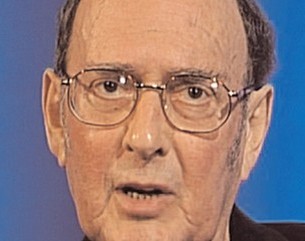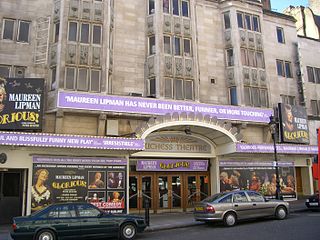Related Research Articles

Harold Pinter was a British playwright, screenwriter, director and actor. A Nobel Prize winner, Pinter was one of the most influential modern British dramatists with a writing career that spanned more than 50 years. His best-known plays include The Birthday Party (1957), The Homecoming (1964) and Betrayal (1978), each of which he adapted for the screen. His screenplay adaptations of others' works include The Servant (1963), The Go-Between (1971), The French Lieutenant's Woman (1981), The Trial (1993) and Sleuth (2007). He also directed or acted in radio, stage, television and film productions of his own and others' works.

Sir Alan Arthur Bates was an English actor who came to prominence in the 1960s, when he appeared in films ranging from the popular children's story Whistle Down the Wind to the "kitchen sink" drama A Kind of Loving.
Henry Woolf, was a British actor, theatre director, and teacher of acting, drama, and theatre who lived in Canada. He was a longtime friend and collaborator of 2005 Nobel Laureate Harold Pinter, having stimulated Pinter to write his first play, The Room (1957), in 1956. Woolf served as a faculty member at the University of Saskatchewan from 1983 to 1997 and as artistic director of Shakespeare on the Saskatchewan from 1991 until 2001.

Simon James Holliday Gray was an English playwright and memoirist who also had a career as a university lecturer in English literature at Queen Mary, University of London, for 20 years. While teaching at Queen Mary, Gray began his writing career as a novelist in 1963 and, during the next 45 years, in addition to five published novels, wrote 40 original stage plays, screenplays, and screen adaptations of his own and others' works for stage, film and television and became well known for the self-deprecating wit characteristic of several volumes of memoirs or diaries.

The Servant is a 1963 British drama film directed by Joseph Losey. It was written by Harold Pinter, who adapted Robin Maugham's 1948 novella. The Servant stars Dirk Bogarde, Sarah Miles, Wendy Craig and James Fox.
Simon Rouse is an English actor, known for playing the role of Detective Chief Inspector, later Superintendent, Jack Meadows in the long-running ITV police drama The Bill.

Georgina Hale was a British film, television and stage actress, known for her roles in the films of Ken Russell, including Mahler, for which she received a British Academy Film Award. She received a Laurence Olivier Award nomination for her performance in the original London production of Steaming. In 2010, she was listed as one of ten great British character actors by The Guardian.

The Duchess Theatre is a West End theatre in the City of Westminster, London, located in Catherine Street near Aldwych.
The Clarence Derwent Awards are theatre awards given annually by the Actors' Equity Association on Broadway in the United States and by Equity, the performers' union, in the West End in the United Kingdom.

Susan Engel is a British actress. She was born in Vienna, Austria.

Butley is a play by Simon Gray set in the office of an English lecturer at a university in London, England. The title character, a T. S. Eliot scholar, is an alcoholic who loses his wife and his close friend and colleague – and possibly male lover – on the same day. The action of the dark comedy takes place over several hours on the same day during which he bullies students, friends and colleagues while falling apart at the seams. The play won the 1971 Evening Standard Award for Best Play.

Up Periscope is a 1959 World War II submarine film drama directed by Gordon Douglas, produced by Aubrey Schenck and starring James Garner and Edmond O'Brien. The supporting cast features Andra Martin, Alan Hale Jr., Edd Byrnes, Warren Oates and Saundra Edwards. The film was shot and processed in WarnerScope and Technicolor and was distributed by Warner Bros. The screenplay was written by Richard H. Landau and Robb White, adapted from White's novel of the same name.

From 1973 to 1975, using approximately 500 movie theaters across the US, The American Film Theatre presented two seasons of film adaptations of well-known plays. Each film was shown only four times at each theatre. By design, these were not films of stage productions — they were plays "translated to the film medium, but with complete faithfulness to the original play script." Filmgoers generally subscribed to an entire season of films, as they might if they purchased a season's tickets for a conventional stage theater. About 500,000 subscriptions were sold for the first season of eight plays using direct mail and newspaper advertising. Ely Landau was the producer for the series.

Otherwise Engaged is a bleakly comic play by English playwright Simon Gray. The play previewed at the Oxford Playhouse and the Richmond Theatre, and then opened at the Queen's Theatre in London on 10 July 1975, with Alan Bates as the star and Harold Pinter as director, produced by Michael Codron. Ian Charleson co-starred as Dave, a Glasgow lout. Michael Gambon took over from Bates in 1976, "playing it for a year, eight times a week." The play also had a successful run on Broadway, opening in February 1977 with Tom Courtenay as Simon and Carolyn Lagerfelt as Beth. It won the New York Drama Critics' Circle Award for Best Play.
Comedy of menace is the body of plays written by David Campton, Nigel Dennis, N. F. Simpson, and Harold Pinter. The term was coined by drama critic Irving Wardle, who borrowed it from the subtitle of Campton's play The Lunatic View: A Comedy of Menace, in reviewing Pinter's and Campton's plays in Encore in 1958.

The Caretaker is a 1963 British drama film directed by Clive Donner and starring Alan Bates, Donald Pleasence and Robert Shaw. It was based on the Harold Pinter play of the same name.
The Tragedy of King Lear is an unpublished screenplay by Harold Pinter. It is an adaptation of William Shakespeare's King Lear and was commissioned by actor and director Tim Roth with backing from Film Four. Pinter completed the screenplay on 31 March 2000, but as of 2017 it has not been filmed. It is one of only three screenplays that Pinter adapted from another dramatist's play, the others being his screenplay adaptation of Butley, by his good friend Simon Gray, and Sleuth, originally written for the stage by Anthony Shaffer.
Butley may refer to:
Sir Michael Victor Codron is a British theatre producer, known for his productions of the early work of Harold Pinter, Christopher Hampton, David Hare, Simon Gray and Tom Stoppard. He has been honoured with a Laurence Olivier Award for Lifetime Achievement, and is a stakeholder and director of the Aldwych Theatre in the West End, London.

Sir Alan Arthur Bates, CBE (1934–2003) is an English actor who hails from Derbyshire, England. He had a prolific career that spanned six decades across stage and screen, with several award-winning portrayals and defining interpretations. His parents were musicians, who encouraged him to pursue music. However, he felt compelled to pursue acting instead, and acquired a scholarship to the RADA in London. Among his fellow aspiring thespians were Peter O'Toole and Albert Finney—each of whom, along with Bates, would be Oscar-nominated by the end of the 1960s.
References
- ↑ Gray, Simon, Simon Gray: Plays 1, Faber 2010